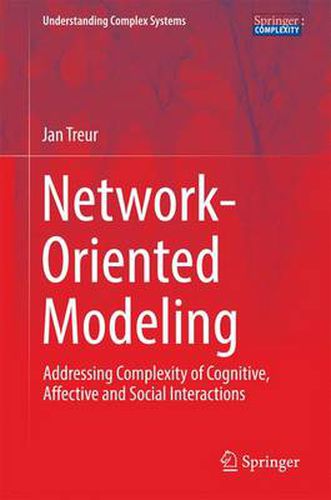Readings Newsletter
Become a Readings Member to make your shopping experience even easier.
Sign in or sign up for free!
You’re not far away from qualifying for FREE standard shipping within Australia
You’ve qualified for FREE standard shipping within Australia
The cart is loading…






This book presents a new approach that can be applied to complex, integrated individual and social human processes. It provides an alternative means of addressing complexity, better suited for its purpose than and effectively complementing traditional strategies involving isolation and separation assumptions.
Network-oriented modeling allows high-level cognitive, affective and social models in the form of (cyclic) graphs to be constructed, which can be automatically transformed into executable simulation models. The modeling format used makes it easy to take into account theories and findings about complex cognitive and social processes, which often involve dynamics based on interrelating cycles. Accordingly, it makes it possible to address complex phenomena such as the integration of emotions within cognitive processes of all kinds, of internal simulations of the mental processes of others, and of social phenomena such as shared understandings and collective actions. A variety of sample models - including those for ownership of actions, fear and dreaming, the integration of emotions in joint decision-making based on empathic understanding, and evolving social networks - illustrate the potential of the approach. Dedicated software is available to support building models in a conceptual or graphical manner, transforming them into an executable format and performing simulation experiments. The majority of the material presented has been used and positively evaluated by undergraduate and graduate students and researchers in the cognitive, social and AI domains.
Given its detailed coverage, the book is ideally suited as an introduction for graduate and undergraduate students in many different multidisciplinary fields involving cognitive, affective, social, biological, and neuroscience domains.
$9.00 standard shipping within Australia
FREE standard shipping within Australia for orders over $100.00
Express & International shipping calculated at checkout
This book presents a new approach that can be applied to complex, integrated individual and social human processes. It provides an alternative means of addressing complexity, better suited for its purpose than and effectively complementing traditional strategies involving isolation and separation assumptions.
Network-oriented modeling allows high-level cognitive, affective and social models in the form of (cyclic) graphs to be constructed, which can be automatically transformed into executable simulation models. The modeling format used makes it easy to take into account theories and findings about complex cognitive and social processes, which often involve dynamics based on interrelating cycles. Accordingly, it makes it possible to address complex phenomena such as the integration of emotions within cognitive processes of all kinds, of internal simulations of the mental processes of others, and of social phenomena such as shared understandings and collective actions. A variety of sample models - including those for ownership of actions, fear and dreaming, the integration of emotions in joint decision-making based on empathic understanding, and evolving social networks - illustrate the potential of the approach. Dedicated software is available to support building models in a conceptual or graphical manner, transforming them into an executable format and performing simulation experiments. The majority of the material presented has been used and positively evaluated by undergraduate and graduate students and researchers in the cognitive, social and AI domains.
Given its detailed coverage, the book is ideally suited as an introduction for graduate and undergraduate students in many different multidisciplinary fields involving cognitive, affective, social, biological, and neuroscience domains.